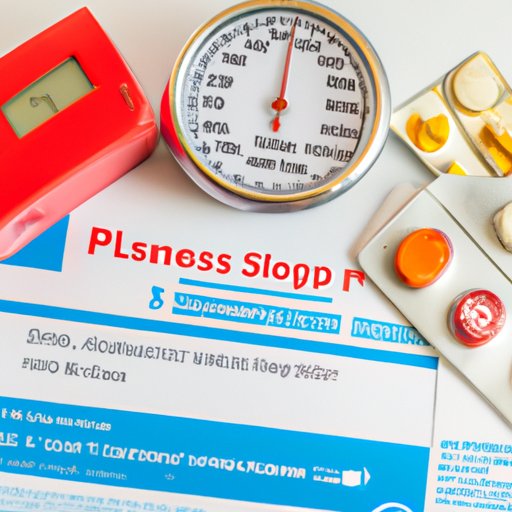
I. Introduction
High blood pressure during pregnancy, also known as gestational hypertension, can be a serious condition that poses risks for both the mother and baby. As an expectant mother, it’s important to take steps to prevent high blood pressure and promote a healthy pregnancy. This article aims to provide tips and strategies for preventing high blood pressure during pregnancy. Whether you are currently pregnant or planning to become pregnant, these tips can help you stay healthy and reduce the risk of complications.
II. Diet and Nutrition
Eating a healthy, balanced diet is crucial during pregnancy to ensure proper nutrition for both the mother and baby. When it comes to preventing high blood pressure, there are specific dietary recommendations that pregnant women should follow.
Reducing salt intake is one of the most important things you can do to prevent high blood pressure. Salt can increase blood pressure, so it’s important to avoid adding extra salt to your food and to choose low-sodium options whenever possible. Additionally, a high-fiber diet with plenty of fruits, vegetables, and whole grains can help reduce blood pressure and prevent hypertension.
Processed foods and foods high in saturated and trans fats should be avoided, as they can contribute to high blood pressure and other health problems. Instead, choose lean protein sources and healthy fats, such as those found in fish, nuts, and avocados.
Staying hydrated is also essential during pregnancy, as it helps keep blood volume up and prevents dehydration-related health problems. Pregnant women should aim to drink at least 8-10 glasses of water per day.
III. Exercise
Regular exercise during pregnancy can help prevent high blood pressure and promote overall health and wellness. It’s important to choose safe exercises that are appropriate for pregnancy and that won’t cause strain or injury.
Low-impact exercises such as walking, swimming, and prenatal yoga are excellent choices for pregnant women. Avoid contact sports or exercises that could result in a fall, and be sure to talk to your healthcare provider before starting any exercise program.
It’s recommended that pregnant women aim for at least 30 minutes of moderate exercise most days of the week, or as recommended by their healthcare provider. Additionally, be sure to warm up properly before exercise and cool down afterwards to prevent injury.
IV. Stress Management
Stress can have negative effects on blood pressure, so it’s important for pregnant women to learn how to manage stress and relax.
Deep breathing exercises, yoga, and meditation are effective ways to manage stress and promote relaxation during pregnancy. It’s also important to set aside time each day for self-care and to avoid over-scheduling or over-committing.
Being aware of triggers that cause stress and making changes to avoid or minimize them can also be helpful. Additionally, it may be beneficial to talk to a mental health professional if stress levels are particularly high.
V. Regular Check-Ups
Regular prenatal visits with your healthcare provider are essential during pregnancy, as they can help detect high blood pressure early and provide appropriate treatment if necessary.
During these visits, your healthcare provider will monitor your blood pressure, weight, and overall health to ensure that you and your baby are staying healthy. It’s important to attend all scheduled appointments and to communicate any concerns or questions with your provider.
VI. Avoiding Alcohol and Tobacco
Alcohol and tobacco can both have harmful effects on blood pressure and pregnancy, so it’s important to avoid these substances altogether during pregnancy.
Smoking during pregnancy can damage both mother and baby, increasing the risk of low birth weight, premature delivery, and other health problems. Similarly, drinking alcohol during pregnancy can lead to fetal alcohol syndrome, a serious condition that can result in developmental issues and other health problems for the baby.
If you’re struggling to quit smoking or drinking, talk to your healthcare provider about resources and support groups that can help.
VII. Medication Management
If you’ve been diagnosed with high blood pressure before pregnancy or during pregnancy, it’s important to work closely with your healthcare provider to manage medication use.
Some medications may not be safe during pregnancy, while others may be safe in specific doses. It’s important to carefully follow your healthcare provider’s instructions and to communicate any side effects or concerns with your provider.
Additionally, it’s important to avoid any medications or supplements that are not prescribed by your healthcare provider, as they may be harmful to you or your baby.
VIII. Conclusion
Preventing high blood pressure during pregnancy is essential to promoting a healthy pregnancy and reducing the risk of complications for both mother and baby. By following these tips and strategies, expectant mothers can help manage their blood pressure and promote overall health and wellness.
Remember to eat a healthy diet, exercise regularly, manage stress, attend regular prenatal check-ups, avoid alcohol and tobacco, and carefully manage medication use. If you have specific concerns or questions, don’t hesitate to talk to your healthcare provider. With the right care and attention, you can have a healthy, happy pregnancy.





